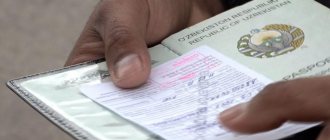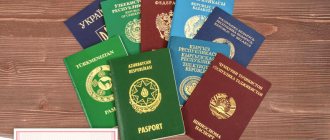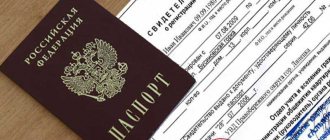If you have temporarily moved from your permanent place of residence to a new one - for example, you came on a long business trip, for training, or have just moved to a new city - you need to register temporarily at the address where you will live. This is a legal requirement. In addition, temporary registration gives a person a number of advantages.
Why do you need temporary registration?
Thanks to temporary registration at the place of residence, a person can use some government and commercial services:
- apply for compulsory medical insurance treatment at a hospital or clinic at your place of stay;
- receive social support, benefits and benefits in social security;
- apply for participation in government support programs (for example, “Young Family”);
- enroll children in a municipal school or kindergarten;
- receive assistance in finding employment at the place of temporary registration;
- obtain a loan from a bank that requires registration in the region where the bank office is located.
Many employers are critical of candidates who are not registered in the region of work. Temporary registration for a long period can solve this issue.
The mandatory registration of registration at a temporary address is established by Federal Law No. 5242-1 of June 25, 1993. If you have registration, you will not be fined for violating it.
Registration costs and fines for violations
For Russian citizens, temporary registration in 2021 is free of charge. There are no duties or additional fees. As for foreigners, for them this procedure, subject to self-registration, will cost 215 rubles. If migrants decide to use the services of intermediary firms, the cost of registration can vary from 500 to 5000 rubles.
Sample of filling out an application for registration at the place of stay
Particular attention is required to adhere to deadlines when completing the procedure.
To obtain temporary registration, you must register no later than 90 days from the date of arrival.
The authorities of the Main Directorate for Migration Affairs of the Ministry of Internal Affairs usually take 3 days to consider the application. If it is necessary to verify information, the period can be extended by 8 days. The certificate is issued the next day after consideration of the application.
Penalties are imposed for violation of registration deadlines. Their size may vary and depends on the location of the place of registration, from 2 to 5 thousand rubles. For property owners, the fine can reach 7 thousand rubles.
Fictitious registration is a criminal offense punishable by imprisonment for 3 years and the imposition of fines: their amount can vary from 100 to 500 thousand rubles.
The basis for imposing penalties is a protocol drawn up by representatives of law enforcement agencies. In the absence of this document, the requirements of the GUVM are unlawful. Such actions may serve as grounds for going to court.
Permanent or temporary registration?
Temporary registration differs from permanent registration in terms of residence at the chosen address. For example, a person is constantly registered at the place of his usual residence, where he lives most of the time. A stamp confirming such registration is placed in the passport.
Read in detail:
How to obtain permanent registration in an apartment or house.
Temporary registration is required if you live for a limited time, more than 90 days, in a certain place. For example, you arrived on a long-term business trip or for training. Instead of a stamp in your passport, you are given a special certificate with the seal of the Ministry of Internal Affairs, which you must always carry with you for possible document verification.
Sample certificate of temporary registration
Having a temporary residence permit does not cancel a permanent one.
Individual cases
The need for temporary registration also applies to children and foreigners.
We advise: Is it possible to register in SNT in 2021?
The following rules apply:
- if a child arrives with his parents at a new place of residence for a period exceeding 90 days, he is required to register;
- in some regions, enrollment in an educational institution is possible only based on territorial residence, which is confirmed by registration, so preference will be given to children assigned to a given school;
- non-residents of the Russian Federation who stay on the territory of the Russian state for more than 7 days are registered for a short-term period.
Temporary registration for a child
Children with temporary registration acquire the same rights as adults in a similar situation:
- free medical care;
- opportunity to study at school;
- register with the local children's clinic;
- attend preschool;
- receive social and other benefits.
When registering on a non-permanent basis, a minor may be issued a registration certificate containing the following information:
Where to start with temporary registration
To obtain a temporary residence permit, you will need a number of consents, which you need to find out in advance:
- temporary registration in a privatized apartment necessarily requires the consent of the owner - the one who is indicated in the extract from the Unified State Register of Housing as the title owner;
- if you are the owner of the apartment in which you are registering temporary registration, you do not need anyone’s consent (even if you only own a share, you do not need to ask the permission of the co-owners);
- if the apartment is in a state or municipal fund and you are its only user, you do not need to take anyone’s permission;
- if in a state-owned apartment or other residents are registered with the municipal fund, you will have to obtain their consent;
- If the apartment is municipal (non-privatized), temporary registration can only be obtained by concluding a sublease agreement.
In all cases where consent is required, it is drawn up when submitting documents for registration. That is, all those who record their consent must come to submit documents - the owner, registered residents. If you can’t come in person, you can contact a notary, who will issue a written consent for an additional fee.
Let's sum it up
Temporary registration, which many people think is an optional document, is in fact not just another piece of paper invented out of officials’ love for bureaucracy. Its presence can greatly simplify your life and open up new opportunities, from professional to everyday. Absence will complicate life not only for you, but also for your landlord, putting him at risk of a fine. Therefore, you should not ignore it, especially since you don’t need so many documents for registration, it takes little time, and you can even do it at the post office. And although those who like to travel and change their place of residence more often than once every three months do not need to overestimate the importance of temporary registration, this small piece of paper can hide great power - which, unfortunately, not all Russian documents can boast of.
Georgy Paradny
Where to go to obtain temporary registration
Documents for temporary registration can be submitted in three ways:
- in person to the department - to the Ministry of Internal Affairs (department for migration issues) or any office of the MFC (My Documents) by appointment or on a first-come, first-served basis;
- passport offices at management companies and homeowners' associations also accept documents for temporary registration;
- online through State Services, having previously prepared scans of documents;
- by mail - but this method is unpopular due to delays in the delivery of written correspondence, as well as the high cost, because all documents will have to be certified by a notary.
Regardless of the method of submission, the application is ultimately considered by the department of the Ministry of Internal Affairs for Migration Issues, serving the desired address. This is where you will need to come to receive a certificate of temporary registration.
List of required documents for temporary registration
To obtain a temporary residence permit you will need:
- ID card (passport);
- Russians permanently residing abroad provide a foreign passport;
- a document confirming the right of residence at the appropriate address (for example, a social tenancy agreement, an extract from the Unified State Register of Real Estate, an application from the owner providing housing);
- for the child - birth certificate.
The owner of the property brings his passport and a document confirming his rights to the property. Housing users living in an apartment from a private fund also bring documents - passports and confirmation of rights to the apartment.
Application form No. 1 (text file for editing) for temporary registration is filled out at a personal appointment or in an online form; you do not need to download or fill out anything in advance. If you send an application by mail, you need to fill out form No. 1PR (text file, can be edited).
For a non-privatized apartment
To register in a non-privatized apartment, you will need to draw up a sublease agreement, otherwise registration will simply not be issued. It is concluded between the tenant and the new tenant with the consent of all living tenants and the landlord. You can obtain documents from the local administration serving the area. In Moscow, you need to contact the Moscow City Property Department.
How to apply for temporary registration in an apartment step by step
Regardless of which apartment requires temporary registration - privatized or non-privatized - the sequence of actions will be the same.
Step one. Collection of documents
Collect documents from the list. At a minimum, you will need a passport of the tenant and owner of the apartment, documents on housing ownership. As a maximum, first conclude a sublease agreement with the administration/department. There is no need to fill out consent and application in advance; this is done at the reception of documents.
If the owner or residents registered in a non-privatized apartment cannot appear in person for registration, their written consent must be obtained in advance from a notary.
Step two. Submitting documents for registration
You can submit documents in person, by mail or through State Services. The safest way is to do this in person through the nearest MFC office (My Documents) or directly at the Ministry of Internal Affairs (police) department dealing with migration issues during reception hours. You need to bring originals and copies of all necessary documents with you and bring people whose consent is required to obtain temporary registration.
The most convenient and fastest way is to submit documents electronically through State Services. Those who have a verified account can take advantage of the opportunity. Not all regions have implemented this opportunity, but in large cities and administrative centers of the country’s constituent entities everything is already working. Documents are submitted in the form of scans or their details are indicated for verification. The application goes directly to the department of the Ministry of Internal Affairs.
Step three. Obtaining a certificate of temporary registration
After the established period – 3 working days – a ready certificate of temporary registration is issued. The period may increase if you submit an application through the MFC or by mail. Sometimes the deadlines are extended if the Ministry of Internal Affairs is forced to make an interdepartmental request for documents, for example, if the sublease agreement referred to by the applicant is not provided.
The certificate can also be received by mail. This is indicated in the application for temporary registration.
It is important to know
- Temporary registration is required if you are staying in a “different” region for more than 90 days.
- The fact of registration is confirmed by a form in Form No. 3; a mark (stamp) is not placed in the passport.
- If you do not obtain temporary registration on time, you and the owner of the property in which you live may be fined.
- Temporary registration can be obtained through the MFC, government services, and the Ministry of Internal Affairs.
- The fastest way to obtain registration is to appear in person at the Ministry of Internal Affairs. Temporary registration will be completed within 3 days.
- Temporary registration for 1000₽ will not be in the database.
The official way of registering is a guarantee of 100% legality, compliance with agreements and the consent of the home owner. Important factors are the availability of suitable living space and carrying out all actions strictly according to the letter of the law. Temporary registration from the owner in Moscow is the best way to quickly become part of the capital’s life, settle down and fully enjoy all the rights provided by law. To save yourself from lengthy searches, unnecessary spending of money and nerves, contact Registration.
Temporary registration deadlines
The standard period for temporary registration is 3 working days. The day of submission and issue of documents is not included in them. The period will be increased if you submit documents not directly to the police, but to the MFC or by mail. Interdepartmental requests also increase registration time - they are necessary in some cases to verify information from the application.
The applicant, in turn, has a week to apply for temporary registration. Registration is required if you are staying at your address for 90 days or more. If the tenant does not do this himself, the owner is obliged to notify the police about his residence within the next 3 days.
Frequently asked questions about temporary registration
A lot of questions are often asked about temporary registration; we have collected answers to some of them below.
What are the consequences of temporary registration for the owner of an apartment? Owners often worry that the temporary tenant will receive some rights to the apartment itself and sue them for part of the living space. This is wrong. The tenant has the right to live in the apartment for a specified period, but does not acquire any rights to the home itself as the owner. You also won’t have to pay any taxes for the new tenant, with the exception of a number of utilities.
Is it legal to charge a fee for registration? This issue is not regulated by law; there is no clear prohibition on charging residents for registration. Only cases of mass registration, when 400 temporary residents are registered on 36 square meters, deserve the attention of the authorities. Other cases of temporary registration, when the owner charges a fee for registration, are, as a rule, not controlled by anyone.
What are the fines if there is no temporary registration ? Responsibility for the lack of temporary registration is established by Art. 19.15.1 Code of Administrative Offenses of the Russian Federation. Under this article, for lack of registration at your place of residence, you can be fined up to 4,000 rubles in the regions and up to 5,000 rubles in Moscow and St. Petersburg. A homeowner who fails to report a temporary tenant faces fines of up to 7,000 rubles. You will not be fined if: - your permanent registration is in the same region; — you live in Moscow Region and work in Moscow and vice versa; — the same rule works for St. Petersburg and the Leningrad region; - you live in an apartment owned by your close relative (spouse, child, parent, grandparent, grandchild, brother or sister).
Is it possible to bypass the requirement for temporary registration? Often, in order not to obtain temporary registration, they buy a new ticket to the region of residence every 90 days. In this case, you must always carry the ticket with you and present it when checking. This may be partly justified and you won't really be fined, but in the long run it can be an expensive option to solve the registration problem.
Migration registration: what the law says
Temporary relocation of Russian citizens within the country is regulated by the following regulations:
- Constitution of the Russian Federation and Civil Code. Russians are allowed to move freely within the country, as well as work, study and relax in any city they like;
- Federal Law No. 5242-1. According to it, every citizen has the right to live briefly in any region of Russia, while having permanent registration in another city. But if a Russian moves for a long time, he is obliged to notify the state about this and undergo temporary registration;
- Government Decree No. 713. The document lists the rules for registering citizens at their temporary address.
All these legislative documents provide for two concepts - place of residence and place of stay. That is, a citizen permanently resides at the address indicated in his passport, but can stay in different places for a short period of time. If a Russian citizen receives temporary registration, he is not removed from permanent registration.











